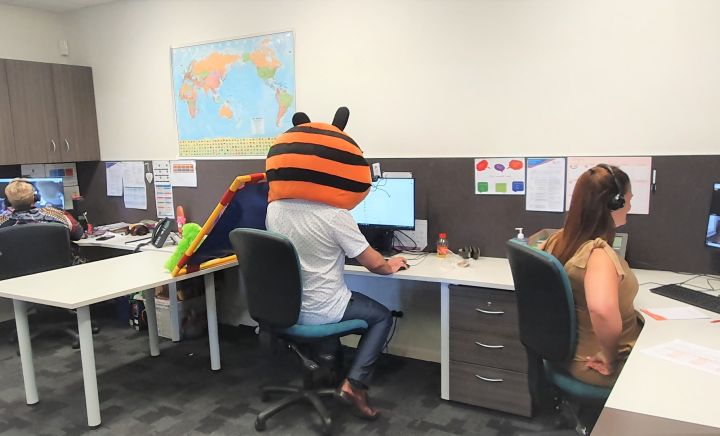How do I know if Distance Education is suitable for my child?
For some autistic students and their families—particularly those living in rural or remote areas, or whose needs are not met by traditional schooling— online schooling can be a more effective and personalised alternative. Aspect’s distance education program has been designed with over 55 years of experience in autism education.
Distance education through Aspect is tailored to students:
- With a formal diagnosis of autism (DSM V),
- Who are geographically isolated, or whose circumstances prevent regular school attendance,
- Who reside in NSW or SA (from Term 2, 2026) and hold Australian citizenship or an eligible visa.
Our enrolment process includes an interview with students and families to assess the best education pathway for your child.
Learn more about student and parent experiences in the program
Is Aspect Distance Education aligned with State mandated curricula?
Yes. students living in NSW follow the NSW Curriculum and students living in SA follow the Australian Curriculum.
The high school program (NSW only) offers a Life Skills curriculum for students unable to access mainstream outcomes.
What kind of learning environment and technology is required at home?
Students must have:
- A distraction-free and structured workspace,
- Access to a computer with a camera, printer, and scanner,
- Reliable internet (preferably wired),
- Backup systems in case of device failure or connectivity issues.
These tools are essential to engage in daily online lessons, submit work, and interact with teachers.
An environmental audit will be conducted to ensure the workspace is conducive to learning.
How does the program handle online safety and cyber behaviour?
Aspect teachers explicitly teach cyber safety each term. Inappropriate behaviour in online sessions may lead to:
- Muting or video restrictions,
- One-on-one sessions,
- Development of a Behaviour Support Plan in collaboration with the family.
How much support is required from parents and carers?
Each student must have an adult on-site supervisor (typically a parent or carer) who:
- Supervises learning activities,
- Supports academic and emotional needs,
- Liaises with the teacher about progress and concerns,
- Attends induction training and ongoing information sessions,
- Helps supervise exams and authenticates student work.
Parents and carers will also be asked to participate in meetings, respond to school communications, and will be invited to attend Connection Days and information sessions.
Will my child have the opportunity to interact with other students?
Yes, students have regular opportunities to connect socially, including:
- Daily group lessons and working sessions online,
- Term-based Connection Days, which include excursions or onsite activities,
- Optional integration opportunities with class-based programs (when appropriate and planned),
- Opportunities to engage socially with peers via optional ‘social links’ in the distance education online classroom.
Social interaction is seen as vital and is built into the program in both structured and flexible ways.
How will student progress be assessed and reported?
Student progress is monitored through:
- Regular submission and review of set tasks and work samples,
- Participation in online and offline learning,
- Progress towards goals set in the Individual Plan (IP) developed with parents,
- Written reports issued twice yearly.
How are fees structured? Is financial support available?
The program is partially government-funded. However, school fees apply to cover the additional costs of the autism-specific model.
- Discounts are available for siblings.
- Financial hardship assistance may be available, subject to need and availability.
What supports are available beyond education?
Aspect also offers:
- Speech Pathology, Occupational Therapy, and Psychology,
- Autism, ADHD, and cognitive assessments,
- Positive Behaviour Support (PBS) frameworks for managing behaviour challenges.
These can be organised separately to the school program.
What are the school hours for distance education
Aspect Distance Education operates 5 days per week and follows a structured school day. The day typically starts with a daily morning meeting:
- Primary students begin at 9:20 AM
- High School students begin at 9:00 AM (NSW only)
During this meeting, the teacher:
- Marks attendance,
- Reviews the day's timetable and tasks,
- Provides an opportunity for social interaction.
Students then participate in scheduled group and one-on-one lessons throughout the day. Lessons are recorded and can be watched at a later date if the student is unable to attend the scheduled lesson time.
Are students required to attend a physical campus during the year?
Students are invited to attend in-person events throughout the school year, even though their regular learning takes place online. These events are designed to support social interaction, curriculum enrichment, and post-school planning.
Key opportunities include:
- Connection Days — these may be on-site or involve off-site excursions linked to classroom learning.
- Curriculum-linked incursions and activities that extend learning beyond the screen.
Parents or on-site supervisors must accompany students to these events, ensuring comfort, safety, and participation. Attendance is highly encouraged, and all activities are planned with autism-specific supports in mind.
Is Distance Education offered for both Primary and High School?
Distance Education is available for years K-12 in NSW and will be offered for years 3-6 in SA from Term 2, 2026.
Will attendance be recorded?
Yes. Teachers mark the roll daily following scheduled group lessons.
Attendance includes engagement in online and offline learning, submission of work, and participation in excursions or Connection Days.
Failure to maintain satisfactory attendance may result in a review of placement.
What happens if my child is ready to transition to a mainstream setting?
Teachers communicate regularly with families and ensure the program is the best option for each Aspect student.
Placements are reviewed every 6 months and a student may be recommended for transition if they are ready. In some cases, Aspect may suggest other settings for students not thriving in distance education.


